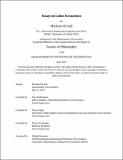Essays in Labor Economics
Author(s)
Uccioli, Martina
DownloadThesis PDF (22.68Mb)
Advisor
Finkelstein, Amy
Jäger, Simon
Acemoglu, Daron
Terms of use
Metadata
Show full item recordAbstract
This dissertation studies two distinct issues in the field of labor economics: the labor supply of new mothers and firms' adjustments to changing labor costs. In both cases, I study the effect of labor market policies, both because they provide quasi-exogenous variation in otherwise endogenous variables of interest, and because of the intrinsic interest in studying the welfare implications of specific policies that governments have direct control over.
The first two chapters, written jointly with Ludovica Ciasullo, consider how maternal labor supply is impacted by working conditions, and how it in turn affects intrahousehold bargaining and task allocation within the household.
In the first chapter we study which work arrangements new mothers choose when allowed to do so, and whether these work arrangements affect their labor supply choices. We exploit the Australian 2009 Fair Work Act, which explicitly entitled parents of young children to request a (reasonable) change in work arrangements. Leveraging variation in the timing of the law, timing of childbirth, and the bite of the law across different occupations and industries, we establish two main results. First, if allowed to request a change in work arrangements, new mothers ask for regularity in their schedule. Second, with regular schedules, working mothers' child penalty declined from a 47 percent drop in hours worked to a 40 percent drop. For the most exposed mothers, the Fair Work Act led to both a doubling in schedule regularity, and a 30% decrease in the child penalty in hours of work.
After establishing that an increase in schedule regularity leads to an increase in maternal labor supply, in the second chapter we study how this translates into division of labor within the household. First, we document that at baseline children bring a 40% increase in their parents' active time -- that is, total time spent on paid work, housework, or parenting -- and that this increase falls disproportionately on mothers, by a 2-to-1 ratio. Second, by exploiting the improvement in maternal labor market conditions brought about by the Australian 2009 Fair Work Act, we show that this gendered allocation of time is not affected by improved labor market prospects for women. Finally, we show that mothers who work longer hours reduce housework, but not time spent directly with children, mitigating concerns that maternal participation in the labor market comes at their children's expense.
The third chapter, written jointly with Andrea Manera, focuses on how labor costs -- via stringency of labor regulations -- influence firms' innovation choices. We study the impact of employment protection legislation (EPL) on firms’ innovation, through an event-study analysis of labor market reforms occurring in Europe over 2000-2016. Data from the Community Innovation Survey reveal that substantial drops in EPL for temporary workers prompt a reallocation of innovation towards the introduction of new products, away from process innovation aimed at cutting labor costs. Among innovative firms, the share of product innovators increases by 15% of the pre-reform value, while the share of firms specializing in process innovation falls by 35%. We develop a theoretical framework of directed technical change to rationalize our findings.
Date issued
2023-06Department
Massachusetts Institute of Technology. Department of EconomicsPublisher
Massachusetts Institute of Technology